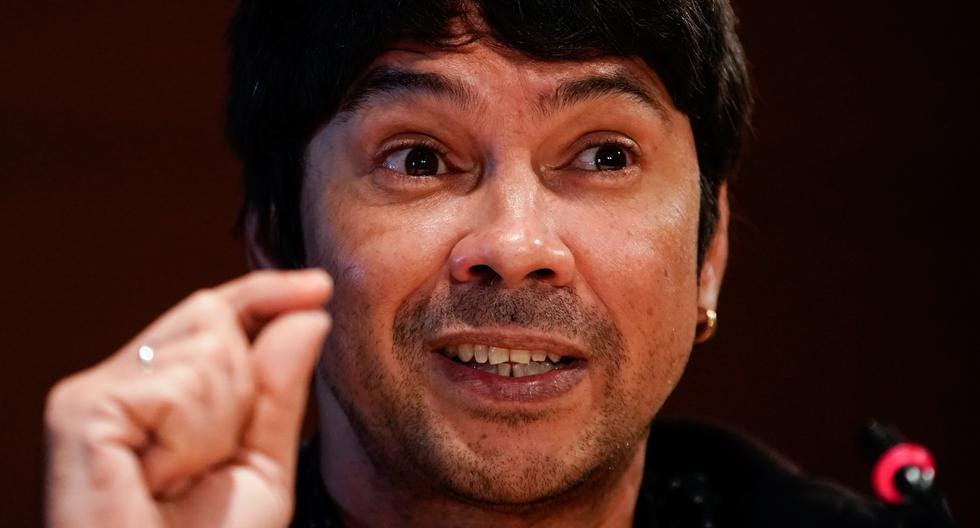Cuban Protest Leader Leaves For Spain
After Yunior Garcia Aguilera's press conference from Spain, Cubans were left with more questions than answers
At the forefront of the planned protests in Cuba on November 15, 2021, was playwright and advocate for the overthrow of the current government in Cuba, Yunior Garcia Aguilera. His protest movement gained traction because he echoes the sentiments of many Cubans - both in the United States and Cuba - based on recent attempts by the government to silence specific artists.
Artists that speak out against the government’s repression.
Garcia took to social media - as any smart activist would. He created groups on various platforms to create a dialogue between the differing factions of Cubans and, more specifically, to help promote the protests. The largest of those groups by far is the Archipiélago group on Facebook.
Many propagandists from both sides of the equation have found a nice little footing in the groups. One of those sides has the U.S. Department of State as its cheerleader. The other, The Cuban government. Between the two, the truth is hard to find because they spread and promote so much disinformation.
But to find the truth, you need to talk to the people. For once I can actually say Facebook served a useful purpose. The conversations made you angry, happy, sad, and motivated for change all at once. The group echoes the diversity of thought among Cubans that I hear from nearly every day.
Archipiélago provides an opportunity to hear from various sides of the political discussion while more easily helping decipher and ignore the most inciteful content designed to pit Cubans against each other. Cubans aren’t interested in any ideas that involve going to war with each other.
Certainly not at the behest of their oppressor to the North.
One thing people in the United States need to understand is that Cuba is a majority Black and Mulatto country. It’s a country where political ideologies are largely divided along racial lines but not definitively. A topic no one ever discusses. The diversity in thought in Cuba is much broader than you think.
To simply say the majority of the country wants to overthrow the government is dishonest. It’s simply not true. In fact, the exact opposite is true. All indicators point to the vast majority of Cubans actually supporting the government but are also seeking major reforms. Another overlooked distinction.
Cubans seeking broad economic and social reforms aren’t necessarily against the government. Many seem to think that all Cubans with economic concerns seek to overthrow the government. The reality is, Black and Mulatto Cubans broadly support the regime. A point Garcia himself made in his presser.
But it was in his addressing the broad support of the government that he suggested something that felt sinister. Garcia attacked the diversity of thought I’m speaking of when he suggested we need to break Cubans from thinking differently than he. Something I can't support.
It’s all but a subtle reminder of whiteness trying to control Blackness in the Caribbean. I’m not saying that’s precisely the case here. But it’s not a good look from the standpoint of the Roman Catholic white supremacy that ravaged Latin America - mostly via Spain and Portugal.
The Archipelago group was meant to hear the voices representing every side of the conversation. But Garcia’s own words tell me differently. While he says that he may be willing to listen to the other side, he’s also saying that he’s really not interested in respecting the ideas of those who support Cuba’s government.
Most would rather see reforms than a complete overthrow of the regime. As such, his ideas have minority support on the island. Cubans have valid fears of U.S. interventionism that may leave the country in limbo like Puerto Rico, or worse, like Iraq or Afghanistan. These are genuine concerns.
Cubans largely (and rightfully) don’t trust the United States.
Another issue of contention - from my point of view - is that the protest organizers were mostly white and government supporters were Black and Mulatto. The recent protests made it all too apparent. The anti-government protesters were wearing white shirts while pro-government activists wore red. This defined a line not only identifiable by the color choices of their shirts, but also by the color of their skin. Something I can’t overlook.
The vast majority of the regime's supporters are Black and Mulatto while the majority of the anti-government protesters are white. While I don't think the protests are racially motivated. Is it possible that they are? I think so. It’s certainly something that shouldn’t be overlooked.
Let’s be clear, it's one thing to say political differences exist along racial lines and it's another to say they're racially motivated. But here's the thing, if the vast majority of government supporters are in fact Black and Mulatto, and the white Cubans who want to overthrow the government are talking the way they are about non-white Cubans (referring to “government supporters”), then yeah, they're being racist asf. They’re using some harsh language.
Again, I'm not saying this is definitively the case, but if it is, it explains a lot of what's happening between protesters and pro-government groups.
While Yunior Garcia expressed his love to those who don't think like him and support communism, his talk about breaking those people so “they can see reality” seems problematic regardless of his motivations.
Regarding the history of the Americas and the “breaking” of Black people of their cultures, religions, and beliefs, it would be par for the course if true. I plan to stay on this story because, well, I'm Cuban. I follow Cuba relentlessly. If I find out any of this is or was racially motivated, you can bet you're gonna hear from me.
Arturo is a first-generation Cuban American father, an anti-racist, advocacy journalist, and publisher of The Antagonist Magazine. You can find him on Twitter, Facebook, and Instagram. You can also support his work here and here.




